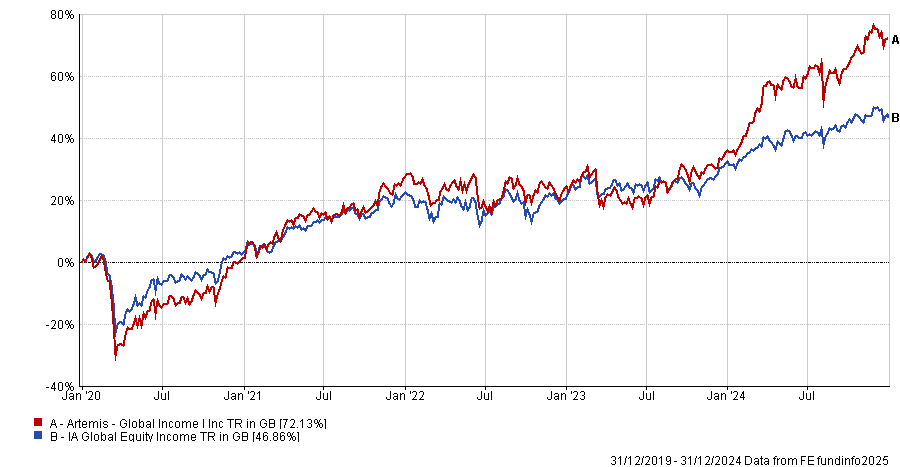Funds in the IA Global Equity Income sector tend to be better at capital growth, according to the latest Trustnet study. Of the best-performing funds in the peer group over the past five years to the end of 2024, just nine have paid out above-average dividends and made capital gains.
Investors typically buy income funds with one thing in mind: getting paid enough in dividends to help with expenses. This is usually for those in retirement but it can be at any stage of life.
As such, we looked at the funds able to make strong positive capital gains while also paying an above-average dividend over the past five years based on an initial £10,000 investment made on 31 December 2019. For this sector, the average income payout was £1,755.37 over the past five years.
We derived the capital gains figure by calculating the dividends on a £10,000 investment and removing this from the total return for the same investment over the same timeframe.
Previously, we have done this for funds in the IA UK Equity Income sector, where the main issue was deriving a capital gain. Here, however, income has been trickier to come by.
Indeed, over the past five years to the end of 2024, the best performers in the IA Global Equity Income sector have all made their gains predominantly through capital growth. Of the 10 best funds in the sector, just one – Artemis Global Income – has paid out an above-average income.
The fund has given back £1,914.50 in dividends over the five years, while its capital gains of £5,298.29 make up the bulk of investors’ profits.
Performance of fund vs sector over 5yrs to the end of 2024

Source: FE Analytics
Run by Jacob de Tusch-Lec and James Davidson, it is an allcap fund that aims to blend successful stock picking with an understanding of the macroeconomic picture.
Analysts at Square Mile Investment Consulting and Research gave it an ‘A’ rating and said: “Although the emphasis of the strategy is on uncovering attractive companies, the manager believes that not taking a topdown view can result in important global trends (and subsequent opportunities) being missed and so could expose the portfolio to unintended risks.
The managers do not exclusively rely upon the typical higher yielding megacap names, but do have a core number of higher yielding stocks that include quality names, This is then supplemented by an outer layer of companies with cyclical characteristics and more risky special situations.
“In our opinion, this strategy differentiates itself from many of its peers by steering away from the more traditional income stalwarts. In addition, it is unlikely to hold significant direct UK exposure as historically it has tended to be held in conjunction with the group's UK equity income strategy,” they added.
“We believe this fund offers a high conviction strategy which, at times, may contain concentrated positions (for example in banking stocks) and so may experience periods of underperformance if these positions are out of favour, alongside periods of stronger performance. However, the fund overall will offer a good diversification benefit to more traditional income strategies.”
Only eight other funds made capital gains and achieved above-average dividend payouts. The next-best performer was the Vanguard Global Equity Income fund, which also sat in the top quartile of the peer group in total return terms during the five years considered.
The fund is actively managed by Vanguard and Wellington and has produced more than £2,000 in income while also achieving a capital return of £3,866.77, giving it the second-highest total return in the table below.

Source: FE Analytics
It was one of three funds on the list to pay out more than £2,000 including Fidelity Global Enhanced Income and Schroder Global Equity Income.
The list also highlights an issue with fund selectors purely looking at the top performers in the sector. For example, Janus Henderson Global Equity Income and Schroder Global Equity Income – the two at the bottom of the table – have both made bottom-quartile total returns over the past five years, but have both achieved above-average payouts, unlike many of their higher-returning competitors.
Analysts at AJ Bell recommend the Simon Adler and Liam Nunn-run Schroder fund despite its total return performance. “The strategy benefits from an extremely disciplined and well-articulated investment process that has been in place for many years. The consistent application of the investment process is a central thread applied across the wider value team at Schroders and is a key element of the fund to generate an income ahead of the benchmark,” they said.
“The team take positions that are very different to the benchmark and therefore the fund could be volatile over short periods and investors may need to be patient.”
Meanwhile, analysts at Barclays Smart Investor backed the Janus Henderson Global Equity Income. They said managers Andrew Jones and Ben Lofthouse “can utilise the research and insight from the other fund managers and analysts across the firm”, which helps them identify the “best investment opportunities across multiple geographical regions”.





